Winter 2024
Bio: Bria Hamilton (She/Her) is a Queer, Disabled, and Black geographer, counter-cartographer, and urbanist based in Toronto, Ontario. She is a graduate of the Master’s of Environmental Studies candidate in the planning stream where her research focused on the use of Black Feminist Geographies and counter cartographies to explore the Black diasporic experience and futurisms through space and time. She brings with her three years of experience in social planning, research, and community engagement.
Abstract: Blackening The City: Counter-Cartographies as a Tool for Community Planning engages with the concept of counter cartographies as a tool for creating spatial equity, underpinned by Black Feminist Theory. Historically and currently, the spatial distribution of cities is heavily skewed to favour those in positions of power. Practices have focused on the needs of socioeconomic elites and prioritized the city as a vehicle for economic success, rather than the success of its residents. Access to social services, transportation, safe and affordable housing, healthcare, and other necessities need to be prioritized in marginalized communities for them to thrive. Black Feminist Theory offers a theoretical lens through which planning processes can be viewed, as it centres the intersection of racialized and gendered oppression towards creating equitable spaces. Black Feminist Theory elevates marginalized voices, as they are the most knowledgeable of the issues they face.
This study focuses on Jane and Finch, a community in Toronto that is predominantly made up of visible minorities, with Black people making up just over twenty six percent of the population. The community is heavily stigmatized, due to stereotypes associated with racialized, migrant, and low-income communities. This study documents ways in which Black women move through and connect with their community using counter cartographic methodologies. Participants in this study are community members engaged in a participatory counter mapping workshop and walking interviews. The information gathered through walking interviews point to the several common spatial experiences of Black women, including consistent uprooting and movement, the need to create spaces where we can experience joy, and the need for resistance in hegemonic spaces. The mapping workshop shed light on themes surrounding desires for community and belonging, increased community resources and programs, safety, cleanliness, and infrastructural changes. A spatial analysis is then performed on the data collected, that culminates in an online mapping tool that writes the community from the view of its residents, and serve as a planning consulting and advocacy tool.
Counter cartographies offer a vehicle through which Black Feminist Theory can be applied. Through using counter cartographic tools and methods, this study rewrites space through a gendered and racialized lens, and subverts the power imbalance that exists in traditional mapping. The final mapping tool includes the knowledges of Black women in Jane and Finch, and visualizes narratives of marginalized communities, voices, and geographies. This study investigates the use of counter cartographies as a vital planning tool towards creating more equitable communities where the needs of marginalized people are met, and their dreams and desires are written into their landscapes. Since urban planners regularly consult maps, I conclude that counter cartographies aid in reworking the underpinnings of planning, and thus ground planning in anti-colonial and anti-oppressive knowledges and practices.
The mapping tool that accompanies this paper can be found here:
https://yorku.maps.arcgis.com/apps/dashboards/9948ce10aeac4c0c913fdf7d5c2a2a27
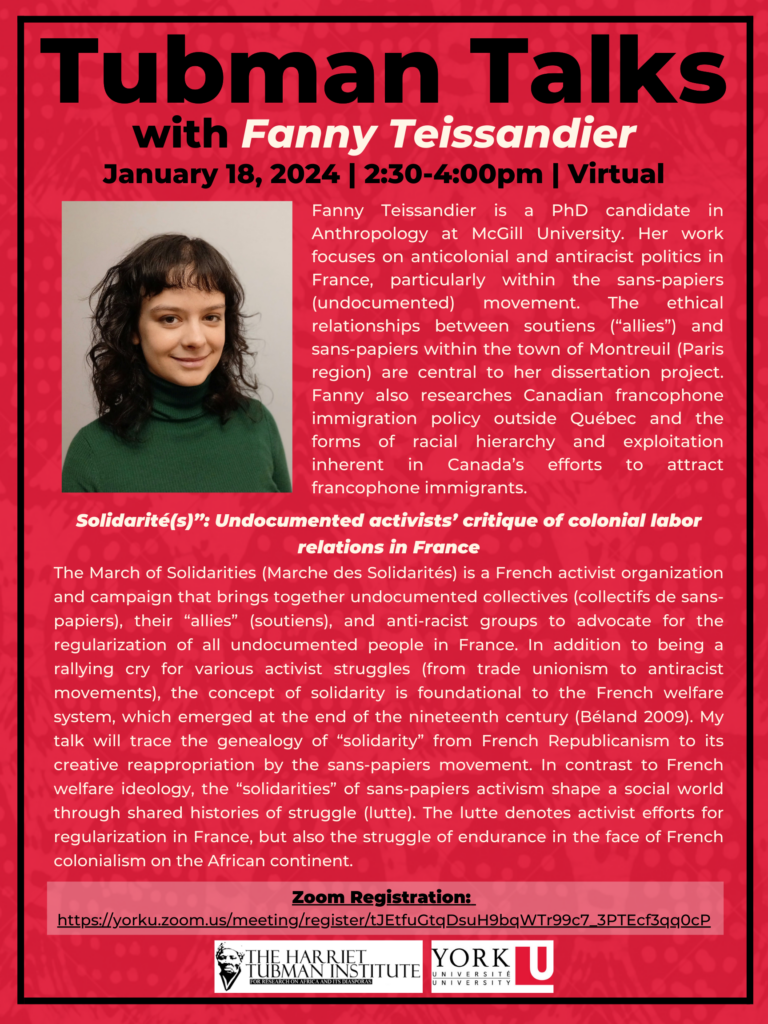
Title: “Solidarité(s)”: Undocumented activists’ critique of colonial labor relations in France
Abstract: The March of Solidarities (Marche des Solidarités) is a French activist organization and campaign that brings together undocumented collectives (collectifs de sans-papiers), their “allies” (soutiens), and anti-racist groups to advocate for the regularization of all undocumented people in France. In addition to being a rallying cry for various activist struggles (from trade unionism to antiracist movements), the concept of solidarity is foundational to the French welfare system, which emerged at the end of the nineteenth century (Béland 2009). My talk will trace the genealogy of “solidarity” from French Republicanism to its creative reappropriation by the sans-papiers movement. The state’s welfare system forges links between members of French society by redistributing the fruits of individual citizens’ labor; without this effort of “socialization”, in a capitalist context of production, workers be bound solely by the disembodied interdependence of market relations. Undocumented workers contribute to the French social system– by paying taxes, for instance – but are excluded from most of its benefits (such as the right to a pension). In contrast to French welfare ideology, the “solidarities” of sans-papiers activism shape a social world through shared histories of struggle (lutte). The lutte denotes activist efforts for regularization in France, but also the struggle of endurance in the face of French colonialism on the African continent. The March of Solidarities performs these histories through the acts of walking and dancing, and ties migrants’ experiences of oppression to a political and economic analysis of colonial labor relations.
Bio: Fanny Teissandier is a PhD candidate in Anthropology at McGill University. Her work focuses on anticolonial and antiracist politics in France, particularly within the sans-papiers (undocumented) movement. The ethical relationships between soutiens (“allies”) and sans-papiers within the town of Montreuil (Paris region) are central to her dissertation project. Fanny also researches Canadian francophone immigration policy outside Québec and the forms of racial hierarchy and exploitation inherent in Canada’s efforts to attract francophone immigrants.


Date: March 14, 2024
Time: 3:00-4:30pm EST
Location: TBD
Register Here
Abstract: In this talk, the innovative field of wastewater-based epidemiology (WBE) and its transformative impact on public health surveillance will be explored, including how scientists are turning sewage systems into vast data sources, detecting everything from viral outbreaks to antibiotic resistance trends. By analyzing the genetic material found in wastewater, researchers can gain invaluable insights into the health status of entire communities, often before clinical cases are reported. This presentation will cover the principles of WBE, showcase cutting-edge research findings, and discuss how this approach is revolutionizing public health responses to disease. Attendees will leave with a deeper understanding of how the unlikeliest of sources is providing a powerful tool for early detection, intervention, and prevention of diseases on a global scale.
Bio: After completing a B.Sc. Honours degree in Microbiology at the University of Guelph, Lawrence completed both his M.Sc. and Ph.D. degrees in Food Science with an emphasis on microbial detection of foodborne pathogens, also at Guelph, before leaving for a Postdoctoral Fellowship to continue his training in microbial food safety in the laboratory of Dr. Michael Doyle in the Center for Food Safety at the University of Georgia. Prior to returning to Guelph, Lawrence has held faculty positions at the University of Wyoming and Colorado State University. More recently, he was the Ian and Jayne Munro Chair in Food Safety in the Food Science Department at McGill University. In January, 2019, Lawrence joined the Department of Food Science as Director of the Canadian Research Institute for Food Safety, where he holds the Canada Research Chair in in Foodborne Pathogen Dynamics. Dr. Goodridge conducts research related to control, detection and surveillance of pathogenic microorganisms including bacteria, viruses and parasites. Dr. Goodridge has published more than 120 peer reviewed journal articles and book chapters, has been awarded more than $50 million in research funding from US, Canadian and international funding sources, and is regularly interviewed by national and international media on topics related to infectious diseases.

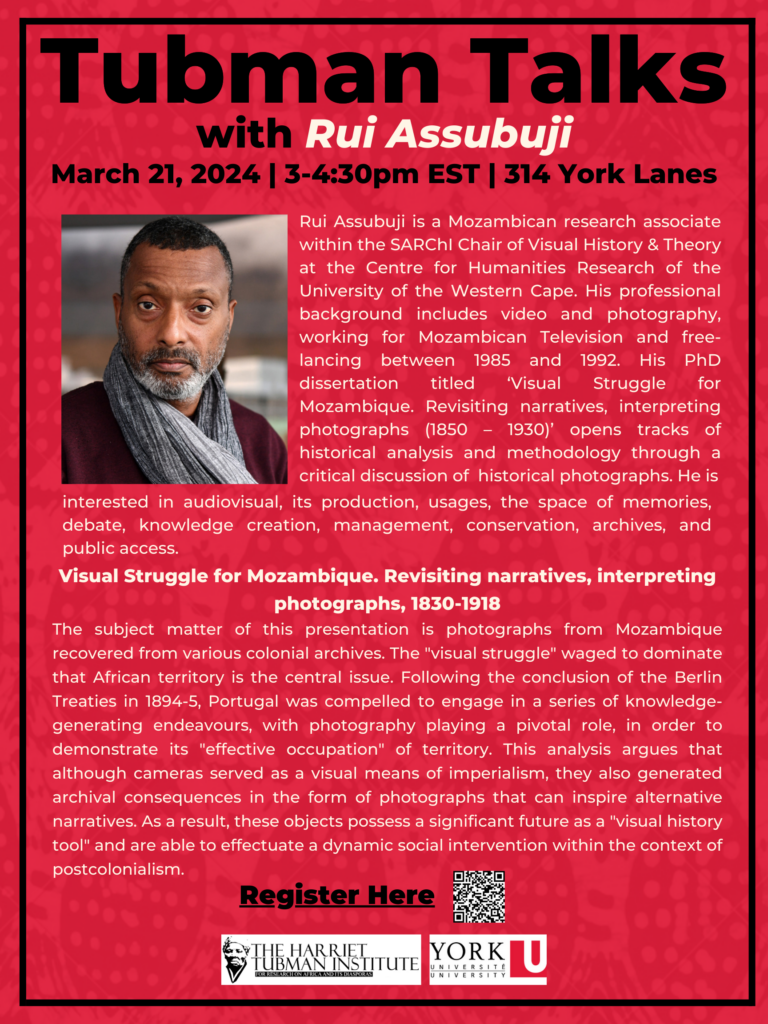
Date: March 21, 2024
Time: 3:00-4:30pm EST
Location: 314 York Lanes, York University, Keele Campus, 4700 Keele St. (Hybrid)
Register Here
This presentation discusses photographs from Mozambique, retrieved from different colonial archives. It requires an engagement with the historiography of the Portuguese empire, initially to provide some context for the East African in the mid- to late 19th century. The central issue is the ‘visual struggle’ undertaken to explore and dominate that African territory. After the Berlin Treaties in 1894-5, Portugal was forced to employ a complex of knowledge-producing activities in which photography was crucially involved to prove its territorial ‘effective occupation’. However, images have a generative quality resulting from their prolific indexical excess; details might become visible out of intense looking, and new understandings emerge prompted by time and experience. This study contends that, while providing an imperial visual narrative, cameras as a ‘tool of empire’ have produced residual archival outcomes, namely photographs that can encourage counter-narratives. Consequently, they have a dedicated future as a ‘tool of visual history’ and are capable of a dynamic social intervention in the post-colonial setting.
Bio: Rui Assubuji is a Mozambican research associate within the SARChI Chair of Visual History & Theory at the Centre for Humanities Research of the University of the Western Cape. His professional background includes video and photography, working for Mozambican Television and free-lancing between 1985 and 1992. His PhD dissertation titled ‘Visual Struggle for Mozambique. Revisiting narratives, interpreting photographs (1850 – 1930)’ opens tracks of historical analysis and methodology through a critical discussion of historical photographs. He is interest in audiovisual, its production, usages, the space of memories, debate, knowledge creation, management, conservation, archives, and public access.


Date: March 28, 2024
Time: 3:00-4:30pm EST
Location: 314 York Lanes, York University, Keele Campus, 4700 Keele St.
Register Here
Abstract: An historic moment occurred on April 22, 1978, when reggae superstar Bob Marley brought then Prime Minister Michael Manley and opposition leader Edward Seaga onstage during the “One Love Peace Concert”, raising their joined hands aloft during the performance of “Jammin’”. This occurred during one of the most violent eras in the country’s brief history as an independent nation.
The concert has become part of Marley legacy, but details of the event's origins, organizers and other performances have been lost in the imaginary of the Global North. This discourse posits Marley as a unifying Rastafarian saviour who brings peace to his nation, but in fact, the peace concert was organized to celebrate a treaty between rival political gangs in west Kingston. The gang leaders, or ‘dons’— Bucky Marshall and Claudie Massop—were simultaneously incarcerated earlier in the year and negotiated the truce. The two men, in conjunction with the Central Peace Council, organized the show and secured Marley’s participation, the singer’s first in Jamaica since he was injured during a home invasion two years prior. The concert featured several performances by popular Jamaican musicians including Big Youth, Jacob Miller and Inner Circle, Culture and Bunny Wailer. One performance that challenged the premise of the evening was that of Peter Tosh. Tosh’s set list and 'reasonings’ in between songs comes closer to subaltern representation than that of Marley, yet it is the latter who is remembered and mythologized.
This essay asks the question: how does the role played by Massop and Marshall in planning the concert, and the militant performance of Peter Tosh recenter its narrative? Whose interests are served by eliding these and other subaltern actors? By attending to the ‘discourse of the other,’ I use Gayatri Spivak’s theorization of the subaltern subject to examine the concert’s legacy.
Keywords: music and social change; Jamaican popular music; reggae; Jamaica - history; cultural identity; race relations; postcolonialism
Bio: Keisha Bell-Kovacs is a Jamaican-born pianist, composer, arranger, and bandleader. She had a long career as a Western art music educator, during which time she began composing. Her love for composition led her to return to university to pursue a bachelor’s and then masters’ degree at York University. Her first album, Caribbean Yellow is a collection of tpieces written for jazz trio. It was a research creation project for her master’s degree that explores identity and coloniality based on “Meditation On Yellow” by Jamaican poet laureate Olive Senior. She is currently a Ph.D. student in ethnomusicology, researching jazz performance and identity in Canada.

Date: April 4, 2024
Time: 3:00-4:30pm EST
Location: TBD
Abstract: TBD
Bio: TBD

Date: April 11, 2024
Time: 3:00-4:30pm EST
Location: TBD
Abstract: TBD
Bio: TBD
Fall 2023
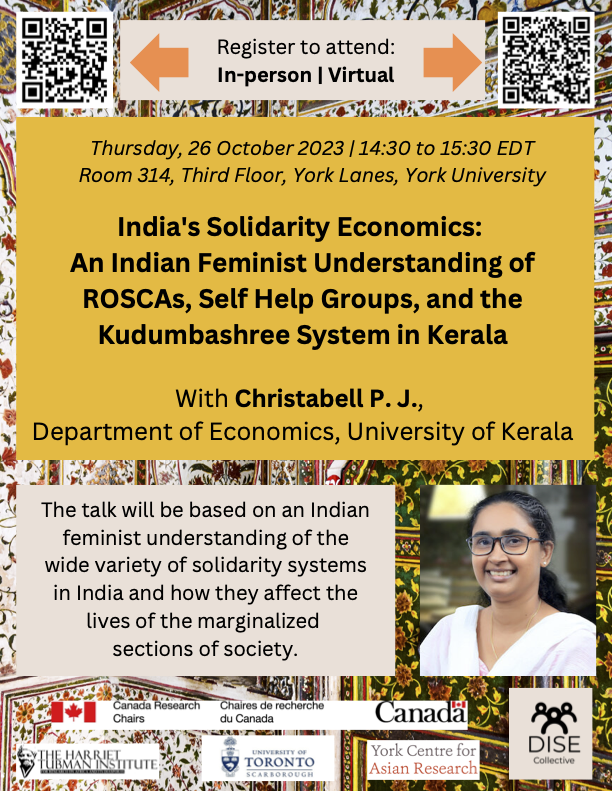
Tubman Talks Special Edition with YCAR: India's Solidarity Economics: An Indian Feminist Understanding of ROSCAs, Self Help Groups, and the Kudumbashree System in Kerala
Date: Thursday, 26 October 2023
Time: 14:30 to 15:30 EDT
Location: Room 314, Third Floor, York Lanes, Keele Campus, York University and virtually via Zoom
With Christabell P. J., Department of Economics, University of Kerala
In the solidarity sector, India is well-known for self-help groups. This ability to mobilize groups is no easy feat in a country with a population of 1.35 billion and hundreds of languages and ethnicities bounded by caste, class and such identities. There are various forms of cooperatives—both informal and formal—in India. Part of the diverse financial economies include Chit funds, a rotating savings and credit association (ROSCA), and this system is both informal and regulated. Kerala's expertise in self-help groups and mutual aid, with innovations such as Chits and Kudumbashree, has earned the state a rightful place as a leading expert on cooperative development. The talk will be based on an Indian feminist understanding of the wide variety of solidarity systems in India and how they affect the lives of the marginalized sections of society.
Dr Christabell P. J. is an academic and researcher in the field of Economics, known for her contributions to social and solidarity economy. She is currently Associate Professor in the Department of Economics at the University of Kerala, Thiruvananthapuram. She is the founder of DISE (Diverse Solidarity Economies) Lab in India, which is funded by the University of Kerala.
Her educational journey began with a Master of Arts degree in Economics from the University of Kerala in 1998 and completed a Doctor of Philosophy in Economics from the same university in 2004.
Noteworthy among her books are titles like Women Empowerment through Capacity Building: The role of Micro-Finance, and Inclusive Growth through Social Capital Formation: Is Microfinance an Effective Tool for Targeting Women?She is co-editor with Caroline Shenaz Hossein of Community Economies in the Global South: Case Studies of Rotating Savings, Credit Associations, and Economic Cooperation.
She is recipient of a K N Raj Fellowship on Research Grant for Researchers in Economics from the Centre for Development Studies, Thiruvananthapuram and Publication Grant from the Indian Council of Social Science Research. She has been awarded research funding from agencies including the University Grants Commission, Kerala State Planning Board, ICSSR, Kerala Council for Historical Research (KCHR), etc.
This event is presented by the Harriet Tubman Institute and the York Centre for Asian Research. The speaker was invited to Canada by the DISE collective and the University of Toronto.

Date: Wednesday, November 1, 2023
Time: 7:00 - 9:30pm ET
Location: McLean Performance Studio, 244 Accolade East Building (2nd Floor)
The McLean Performance Studio is fully accessible.
On Wednesday November 1st, The School of the Arts, Media, Performance and Design (AMPD) will host a screening of the 2023 biographical documentary MABOUNGOU: Being in the World (48 minutes) followed by a discussion panel featuring Governor General’s Performing Arts Award-winner Zab Maboungou and three internationally renown dance artists – Isaac Akrong, Florent Nikiéma, and Pulga Muchochoma. This special event is a collaboration between the Department of Dance and the Harriet Tubman Institute, addressing how colonial pasts inform the present experience of dance artists of African descent working in the diasporas.
Panel Moderator: Collette ‘Coco’ Murray, arts educator and doctoral student in Dance
Sponsored by PUBLIC: journal of art, culture and ideas.
This event will be presented in English and French.
PRODUCTION COMPANY
Mouvement Perpétuel is an award-winning Montreal-based independent film, video, and new media production company specializing in arts programming. Co-directors Marlene Millar and Philip Szporer create impressionistic dance-media films, arts documentaries and multi-channel video installations. MABOUNGOU: Being in the World has received critical success at dance and film festivals around the world since its release in 2023.

Date: Friday, November 17, 2023
Time: 2:30-4:00pm ET
Title: On (in)visibility: women in colonial iconography during the Portuguese Estado Novo (1930s – 1940s)
Abstract: The aim of this presentation is to reflect on the presence of colonized women in photographs and other representations, such as drawings, posters, postcards, exhibition catalogues, newspapers and magazines, which were disseminated in the context of the Portuguese colonial expositions, and in exhibition spaces conceived by the Portuguese with a colonial component. Generally speaking, the exhibitions sought to put forward the progress, taking into account land, rail and sea transport, but also roads, communications, trade, industry, arts, architecture, culture, and the most recent advances in science and medicine. The exhibitions were also places where the logic of colonial models was staged, showing a clear relationship between colonial domination and gender representation. The research includes several materials produced throughout the 1930s (a fertile period regarding the Portuguese participation in this kind of international events) intended to publicize these exhibitions or serve as a complement to them. These materials may include art works or merely propagandistic works, or works that combine both components. The analysis will include materials associated with several exhibitions between 1931 and 1940, such as the International Colonial Exhibition of Paris (1931), the Lisbon Industrial Exhibition (1932), the Portuguese Colonial Exhibition in Porto (1934), the Exhibition of the Portuguese World in Lisbon (1940), and the Portugal of the Little Ones (Portugal dos Pequenitos) in Coimbra (1940). The contexts in which women appear and the way they are represented — as active beings (performing tasks), as contemplative beings (as in natural landscapes) or as objects of sexual desire, revealing the context of power (legislative, administrative, male and colonial) in which the images and the representations were produced — will be analyzed.
Bio: Patrícia Ferraz de Matos is an anthropologist, research fellow at the Instituto de Ciências Sociais (ICS), Universidade de Lisboa (UL), and member of the teaching staff of the PhD in Anthropology of UL since 2013. She is associate editor of Anthropological Journal of European Cultures (2020-2024), convener of the Europeanist Network of the European Association of Social Anthropologists (EASA) (2020-2024), deputy director of the journal Análise Social (2021-2024) and correspondent member, in Portugal, of the History of Anthropology Network of EASA since 2019. She is also Fellow of the Royal Anthropological Institute of Great Britain and Ireland, since 2019, and member of the Advisory Board of the International Association of Social Sciences and Humanities of Portuguese Language, representing the meritorious member ICS-UL (2021-2025). She is the author of The Colours of the Empire: Racialized Representations During Portuguese Colonialism (Berghahn Books, 2013) and of Anthropology, Nationalism and Colonialism: Mendes Correia and the Porto School of Anthropology (Berghahn Books, 2023). Prizes: Victor de Sá Prize in Contemporary History 2005; ERICS Prize (ICS-UL/CGD) 2014; Scientific Prize - Honourable Mention (UL/CGD) 2019.
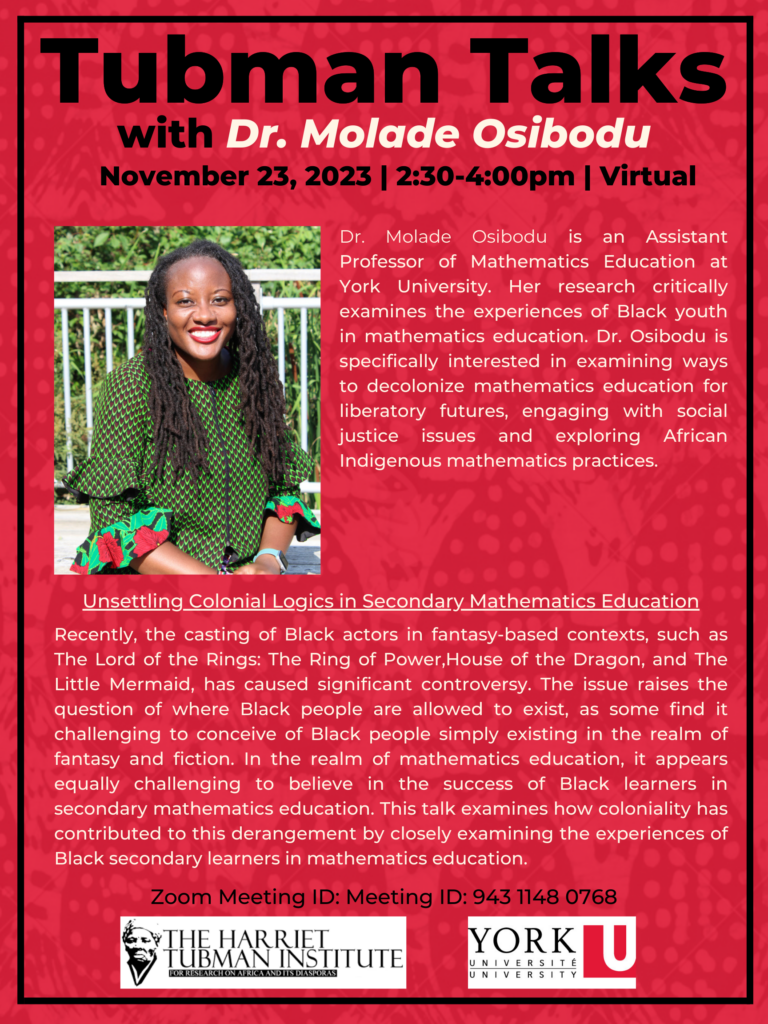
Date: Thursday, November 23, 2023
Time: 2:30-4:00pm ET
Location: Zoom
Title: Unsettling Colonial Logics in Secondary Mathematics Education
Abstract: Recently, the casting of Black actors in fantasy-based contexts, such as The Lord of the Rings: The Ring of Power, House of the Dragon, and The Little Mermaid, has caused significant controversy. The issue raises the question of where Black people are allowed to exist, as some find it challenging to conceive of Black people simply existing in the realm of fantasy and fiction. In the realm of mathematics education, it appears equally challenging to believe in the success of Black learners in secondary mathematics education. Katherine McKittrick’s (2006) Demonic Grounds delves into how physical and material spaces reveal the non-neutral nature of spatiality, particularly for Black people. McKittrick queries, “what is it about space, place, and blackness—the uneven sites of physical and experiential ‘difference’—that derange the landscape and its inhabitants?” (p. 3). This talk examines how coloniality has contributed to this derangement by closely examining the experiences of Black secondary learners in mathematics education. I challenge the notion of exceptionality by arguing that Black learners success in mathematics should be normalized. Furthermore, these experiences underscore the imperative to reimagine spaces and to contemplate the conditions under which Black mathematics learners not only exist but thrive in mathematics education.
Bio: Dr. Molade Osibodu is an Assistant Professor of Mathematics Education at York University. Her research critically examines the experiences of Black youth in mathematics education. Dr. Osibodu is specifically interested in examining ways to decolonize mathematics education for liberatory futures, engaging with social justice issues and exploring African Indigenous mathematics practices.
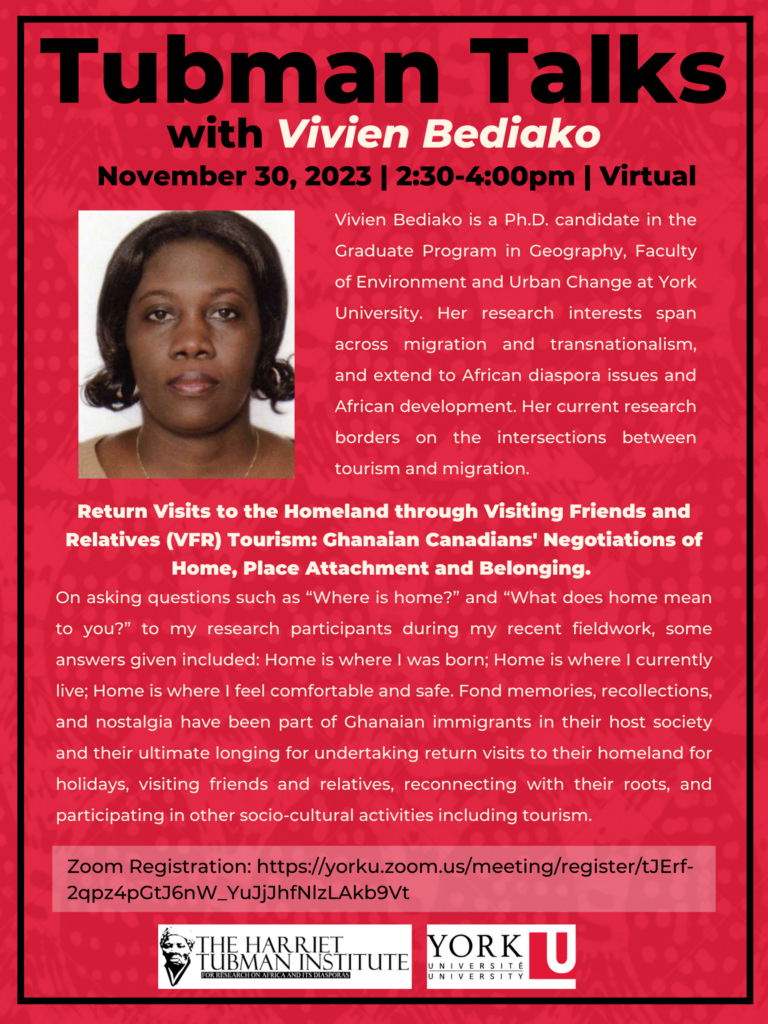
Date: Thursday, November 30, 2023
Time: 2:30-4:00pm ET
Location: Zoom
Title: Return Visits to the Homeland through Visiting Friends and Relatives (VFR) Tourism: Ghanaian Canadians' Negotiations of Home, Place Attachment and Belonging.
Abstract: On asking questions such as “Where is home?” and “What does home mean to you?” to my research participants during my recent fieldwork, some answers given included: Home is where I was born; Home is where I currently live; Home is where I feel comfortable and safe. Fond memories, recollections, and nostalgia have been part of Ghanaian immigrants in their host society and their ultimate longing for undertaking return visits to their homeland for holidays, visiting friends and relatives, reconnecting with their roots, and participating in other socio-cultural activities including tourism.Adopting a cultural-geographical perspective, I draw on theories from the geographies of home, the geographies of belonging, and the place attachment theory to explore the social and cultural processes attached to immigrants’ return visits to their homeland from a gendered and generational perspective, and through a spatio-temporal lens.Drawing on my ongoing research where I am conducting qualitative semi-structured interviews on first-generation Ghanaian immigrants living in Canada and their second-generation adult children, this presentation specifically discusses the meanings they attach to home, how they construct and negotiate home, and how they reconceptualize the notion of home as they engage in return visits to their homeland.
Bio: Vivien Bediako is a Ph.D. candidate in the Graduate Program in Geography, Faculty of Environment and Urban Change at York University. Her research interests span across migration and transnationalism, and extend to African diaspora issues and African development. Her current research borders on the intersections between tourism and migration.
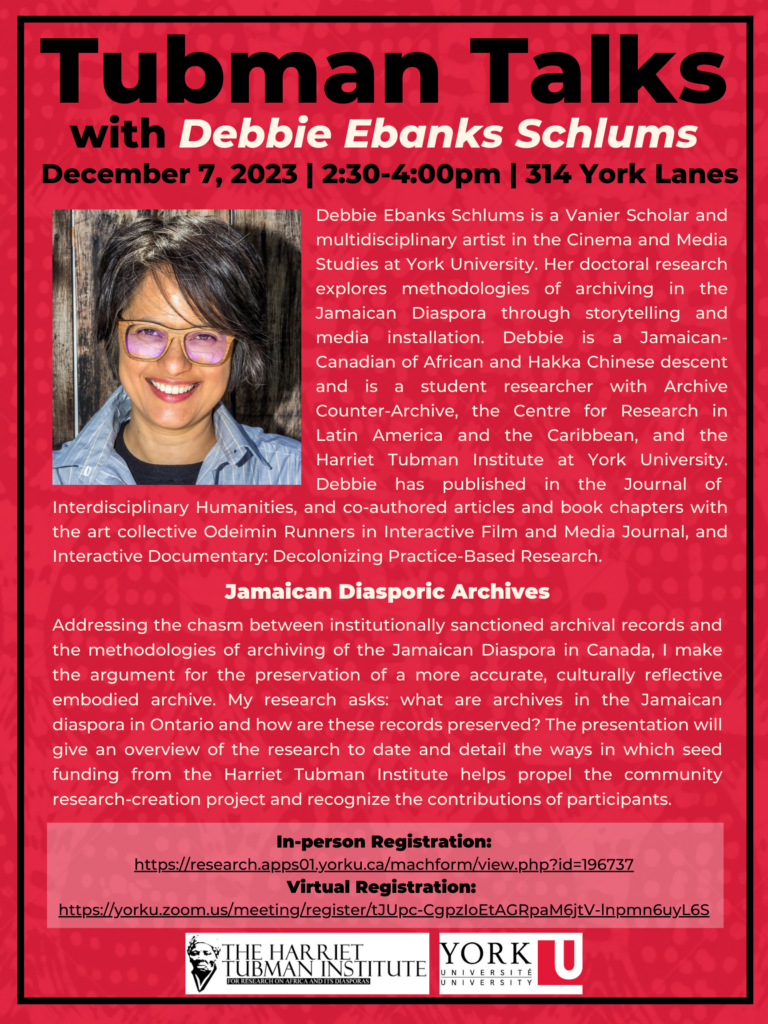
Date: Thursday, December 7, 2023
Time: 2:30-4:00pm ET
Location: Resource Room - 314 York Lanes, York University, Keele Campus
Title: Jamaican Diasporic Archives
Abstract: Addressing the chasm between institutionally sanctioned archival records and the methodologies of archiving of the Jamaican Diaspora in Canada, I make the argument for the preservation of a more accurate, culturally reflective embodied archive. My research asks: what are archives in the Jamaican diaspora in Ontario and how are these records preserved? The presentation will give an overview of the research to date and detail the ways in which seed funding from the Harriet Tubman Institute helps propel the community research-creation project and recognize the contributions of participants.
Bio: Debbie Ebanks Schlums is a Vanier Scholar and multidisciplinary artist in the Cinema and Media Studies at York University. Her doctoral research explores methodologies of archiving in the Jamaican Diaspora through storytelling and media installation. Debbie is a Jamaican-Canadian of African and Hakka Chinese descent and is a student researcher with Archive Counter-Archive, the Centre for Research in Latin America and the Caribbean, and the Harriet Tubman Institute at York University. Debbie has published in the Journal of Interdisciplinary Humanities, and co-authored articles and book chapters with the art collective Odeimin Runners in Interactive Film and Media Journal, and Interactive Documentary: Decolonizing Practice-Based Research.












